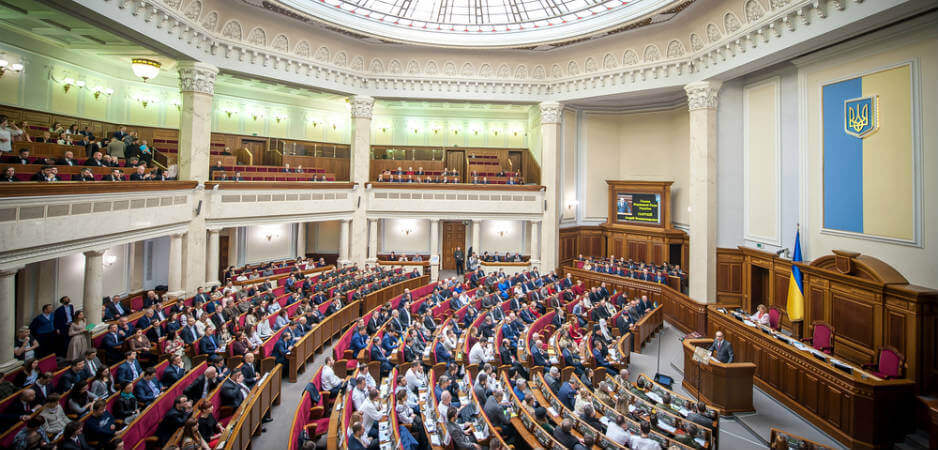If reforms are not implemented in the near future, another revolution might be on the horizon for Ukraine.
Ukraine‘s political and socioeconomic circumstances have become the subject of various debates across Europe and the United States. The focus of these discussions has been the decreasing optimism among Ukrainians about the limited progress the government has made over implementing structural reforms, which were announced after parliamentary elections in October 2014. These reforms promised to bring changes to the judicial, health care and pension systems, as well as a decentralization of the state and closer relations with the European Union and the West.
Over the past four years, these reforms have been implemented at an extremely slow pace. This lack of progress contrasts starkly with the hope and enthusiasm among Ukrainians in the aftermath of Euromaidan protests and the ensuing “Revolution of Dignity” that took place between November 2013 and February 2014. While efforts to reform the country’s social, economic and political systems have continued, they have been slower than the people had hoped.
This snail pace has already generated animosity and concern, both among the public and analysts inside and outside Ukraine, who claim that the country’s leadership is stalling the implementation of reforms. Some nongovernmental organizations and observers, for instance, pointed at the government’s lack of satisfactory progress in the Prosecutor General’s Office investigation into former President Viktor Yanukovich and the government’s apparent reluctance to probe corruption allegations that plagued his administration and to prosecute those who enabled it.
Stalling Reform
For instance, the reform of the judiciary, prosecutorial and law enforcement systems, which were expected to strengthen domestic order and security, have been implemented in a slow and controversial manner. One of the main demands of the Euromaidan protesters was the establishment of impartial courts, free from corruption and independent enough not to bend to vested interests of Yanukovich or his associates. A proposed re-attestation of judges and police officers was expected to bring more transparency to the system as a whole.
According to Maria Popova, associate professor at McGill University, despite calls from all sectors of society, including the government itself, “Yanukovych-era judicial elites have so far actively resisted attempts to be purged and have refused to bow down to the new government.” Even though Ukraine’s then Prime Minister Arseniy Yatsenyuk himself called for full re-attestation of 9,000 of Ukrainian judges as early as December 2014, it soon became evident that judges who undertook but did not pass the re-attestation exam would still be able to retain their jobs. The High Council of Justice, the institution responsible for the nomination of judges, ignored 75% of negative evaluations, meaning that those judges deemed unsuitable, incompetent or openly corrupt were able to stay in office, stalling the process of eliminating corruption in Ukraine.
When it comes to money laundering, it has become clear that under-the-table commitments have prevented reformists, activists and even judges from exposing and prosecuting those involved in illegal economic activities. While new legal provisions have been put into place to deter the practice, it can be confidently affirmed that money laundering is still widespread in Ukraine. Acts of corruption are still taking place on a daily basis both in private and public sectors. Tax evasion, fraud and the creation of shell companies have enabled the continued existence of an underground economy, where money is hidden, laundered and converted into funds transferred out of the country. As the Council of Europe has reported, the widespread use of cash and the existence of “so-called conversions centres through which funds are siphoned from the real to the shadow economy” has made the country especially vulnerable to money laundering.
Unsurprisingly, those individuals engaged in money laundering are the very same government officials who are supposed to be eradicating it. Given that Yanukovich and his associates controlled the country’s judiciary and law enforcement systems, they had, according to The Guardian‘s Oliver Bullough, “broad discretionary powers to initiate or block investigations.” Rather than curbing money laundering, the pre-Euromaidan government actively sustained the conditions that enabled corruption, domestically and internationally, through direct actions by officials and the use of tax havens abroad. By 2014, for example, more than 90% of Ukraine’s outward investment was channeled to Cyprus, to accounts owned by top Ukrainian government officials and oligarchs.
Furthermore, it is not just Ukraine’s public institutions and officials that are involved in illegal economic activities. An investigation conducted by the National Bank of Ukraine revealed that PrivatBank, the largest commercial bank in the country, had only just fallen short of exercising absolute nepotism in the allocation of its corporate loans. According to Reuters, 95% of the loans went to “companies related to the former owners” of the bank and had been regularly used for money laundering and large-scale coordinated fraud, headed by the oligarch Ihor Kolomoisky. The central bank targeted this massive illegal operation, which, according to some estimates, led to the loss of $5.5 billion for PrivatBank and to its subsequent collapse, portraying it as a token of the government’s serious commitment to fighting money laundering. To this date, however, there has been no meaningful progress on the investigation, and the bank was only fined — by the Central Bank of Cyprus, not Ukraine’s — for a total of €1.5 million ($1.8 million) for breaking anti-money laundering regulations.
Despite the law’s purported objectives on transparency and oversight, there is a high probability that only the oligarchs who already possess the economic means will be able to actually buy former state property in Ukraine.
Health-care reform does not seem to be faring any better. Back in March 2009, then Prime Minister Yulia Tymoshenko proposed to upgrade the country’s health-care system. The cornerstone of the reform was the creation of a new state agency, the National Health Service of Ukraine, modeled after the United Kingdom’s NHS. This agency would administer and allocate funds for financing the provision of health services for the Ukrainian population through the creation and operation a national network of family doctors (general practitioners) and the improvement of the medical emergency services nationwide. In October 2017, Ulyana Suprun, Ukraine’s acting health minister, declared that the reform will soon be finalized.
While there are a number of benefits to the proposed reform, the fact is that it is envisioned in a country with very different socioeconomic conditions to those of the UK. For instance, there are proposals for paramedics rather than doctors to visit patients requiring care at home. Given that profession of paramedic did not exist in Ukraine until very recently, there is a shortage of specialists throughout the country. So far, the system has left positions unfilled and patients unattended. Given that the need to implement a new education track aimed at training paramedics is costly, there is a shortage of equipment and transport. Moreover, the profession itself can be quite risky. For all these reasons, reforms have to be better adapted to the immediate reality, needs and expectations of Ukraine and its people.
Lack of Progress
Although there are many other reforms to be implemented, the lack of visible progress progress has been frustrating. By contrast to judicial and financial reforms, the highly lucrative sale of state property and opening of the land market has moved at a very fast pace. In March 2018, President Petro Poroshenko signed a law that could revolutionize the state’s approach to privatization of state and municipal property and establish a more competitive and transparent procedure for its sale and acquisition. The new law condenses all the rules on privatization — which were previously scattered across seven different pieces of legislation — and also aims to make sales more transparent through setting up online auctions for low-value properties and regulated auctions for high-value ones.
Although the US, the EU and the International Monetary Fund have been actively pushing for this reform, its benefits for the Ukrainian public are still unclear. Despite the law’s purported objectives on transparency and oversight, there is a high probability that only the oligarchs who already possess the economic means will be able to actually buy former state property in Ukraine. The acquisition of land, including former state and municipal property, usually involves high administrative costs for the buyers.
Moreover, big buyers and sellers usually possess better information, leading to limited competition and inadequate allocation of land resources. The fast pace at which this law has been introduced has left little time to implement mechanisms that ensure equity, fairness and protection of property rights of small and medium-sized buyers and sellers through the creation or improvement of appeal and dispute resolution mechanisms. It is paradoxical that both the Ukrainian and foreign governments, as well as Western-led economic institutions, have not called for a more thorough consideration and restraint on the implementation of this law, especially when small and medium-sized actors in the land market are being deprived of economic opportunities as a result of rent-seeking practices by large buyers and sellers.
As The Washington Post recently stated, “the window for reform is closing in Ukraine.” Most of the population is tired and dissatisfied with this situation. In November 2013, Ukraine proclaimed its willingness to defend democracy through revolution and further integration with Europe. Enough time has passed since the 2014 Maidan uprising for the government to deliver results to the people of Ukraine. Had reforms been better suited to Ukraine’s immediate reality and needs, they could have already achieved much better results.
The government of Ukraine needs to listen to popular discontent. Legal reform in Ukraine would have been better and more meaningful if it had been genuinely aimed at fighting corruption raging across state institutions and diminishing the power of oligarchs rather than just curbing some of it. There is only so much time the Ukrainian people can tolerate the same dire situation repeating itself. Should these and other reforms not be implemented in the near future, another — and potentially more violent — revolution might rise on Ukraine’s horizon.
The views expressed in this article are the author’s own and do not necessarily reflect Fair Observer’s editorial policy.
Photo Credit: Sharomka / Shutterstock.com
Support Fair Observer
We rely on your support for our independence, diversity and quality.
For more than 10 years, Fair Observer has been free, fair and independent. No billionaire owns us, no advertisers control us. We are a reader-supported nonprofit. Unlike many other publications, we keep our content free for readers regardless of where they live or whether they can afford to pay. We have no paywalls and no ads.
In the post-truth era of fake news, echo chambers and filter bubbles, we publish a plurality of perspectives from around the world. Anyone can publish with us, but everyone goes through a rigorous editorial process. So, you get fact-checked, well-reasoned content instead of noise.
We publish 2,500+ voices from 90+ countries. We also conduct education and training programs
on subjects ranging from digital media and journalism to writing and critical thinking. This
doesn’t come cheap. Servers, editors, trainers and web developers cost
money.
Please consider supporting us on a regular basis as a recurring donor or a
sustaining member.
Will you support FO’s journalism?
We rely on your support for our independence, diversity and quality.






